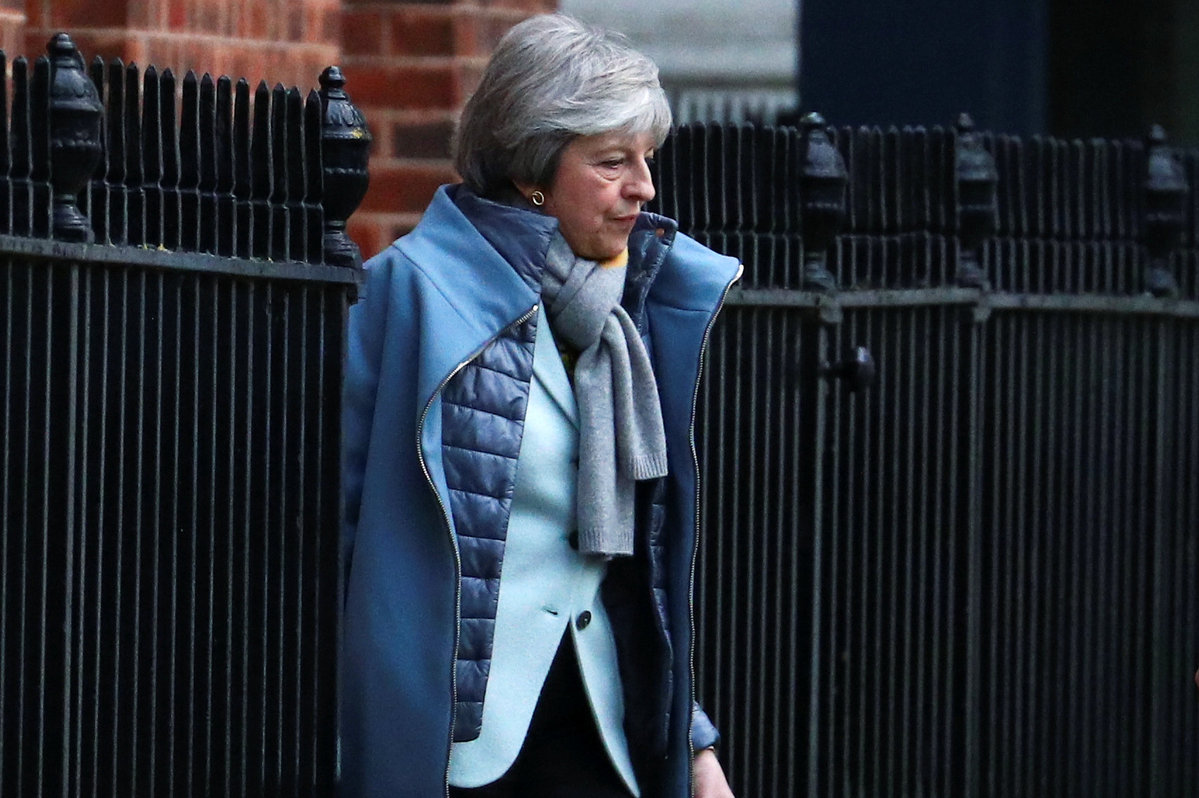May backs down over EU citizens residency fee
By Julian Shea in London | China Daily | Updated: 2019-01-22 09:28

No Deal Brexit remains on table as part of 'Plan B'
British Prime Minister Theresa May has announced her government is dropping the 65-pound ($84) charge for European Union citizens to apply for settled status in Britain after the country's exit from the EU, known as Brexit, and refunding the fee for anyone who has already paid.
The announcement came as she addressed the House of Commons with details of her so-called Brexit Plan B proposals, after her initial scheme, endorsed by the leaders of the other 27 EU member states, was resoundingly rejected by members of Parliament last week.
There had been speculation that May was set to announce the dropping of the so-called Irish Backstop as part of her Plan B. As it stands, the Irish backstop proposal means that if a trade deal to keep an open border between Northern and the Republic of Ireland cannot be reached in time for Brexit, the United Kingdom would effectively continue to be part of an EU customs union, with detailed points to be finalized.
This is unpalatable to many hardline Brexit supporters and highly contentious with Northern Ireland's Democratic Unionist Party, upon whose support May's minority government relies for support.
But any interference with the backstop would have been hugely controversial, as it would have been seen as compromising the Good Friday Agreement, the settlement agreed in 1998 between politicians in Great Britain, Northern Ireland and the Republic of Ireland, which brought about the end of the decades of bloody civil conflict in Northern Ireland known as the Troubles.
This prospect had been flatly rejected by both the Irish government and EU negotiators, but in the event May said "this government will not reopen the Belfast agreement" and insisted she had "never" considered doing so.
Following last week's defeat, May had said she would engage in cross-party talks, but they never happened after Labour leader Jeremy Corbyn insisted he would not take part unless the prospect of a No-deal Brexit, meaning Britain leaving with no arrangement in place and potentially having huge economic and social impact, was ruled out.
May has still not taken this possibility off the table, saying that the best way to rule out No-deal was to agree a deal with the EU, or alternatively, to extend Britain's Article 50 period of notice, but the EU would only be willing to agree to this if there was a clear plan of intent attached.
This, she said, would not respect the result of the 2016 referendum, because by ruling out No-deal, the government would effectively be revoking Article 50. She also rejected calls for a second referendum, saying it was "our duty" to go through with the result of the first one, and warned that it would set a dangerous precedent.
In his response, Corbyn said the lack of concessions May had made demonstrated that she was still in denial about the size of her defeat last week, and he called her plan for cross-party talks "a sham".
Labour will back amendments seeking to rule out a No-deal Brexit, he added, and will look at the case for a people's vote on the final outcome.
May said the government is now seeking advice from a "range" of voices independent of Parliament as to what should be the next steps, and that progress was being made but Corbyn "doesn't know because he didn't turn up."
If the much-discussed No-deal Brexit should happen, the government has drawn up contingency plans for troop deployment in the case of potential civil unrest, and conducted tests for the disruption that would be caused at British ports where goods are imported.
The National Health Service has become the world's biggest buyer of refrigeration, to stockpile medicines, and now private individuals are following that lead.
The Guardian newspaper says three-quarters of UK warehouse owners reporting fears about Brexit have driven up storage costs by up to 25 percent in the last three months.
In a survey conducted by the UK Warehousing Association, or UKWA, 85 percent of those questioned said they had received inquiries related to Brexit, and almost 75 percent were now unable to take on new customers.























